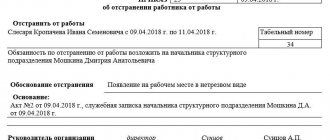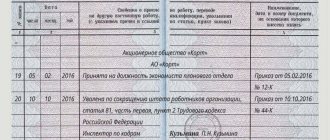Grounds and reasons
Article 76 of the Labor Code of the Russian Federation lists situations in which an employee is necessarily suspended from work:
state of intoxication (drug, alcohol, toxic);- the employee has not undergone training and knowledge testing on labor protection;
- lack of medical examination results;
- medical contraindications for performing work;
- suspension of a special permit or employee's right;
- requirement of authorized government bodies or officials (labor inspectorate, court, etc.);
- other cases mentioned in the current legislation.
Nuances of the grounds
Despite the fact that in Art. 76 of the Labor Code provides a fairly complete list of reasons for dismissal; some employers do not always understand in what cases they can be applied, because life circumstances are different, and it is not always clear how they are consistent with legislative norms:
- For example, an employee who shows up at the company while drunk can be suspended only if this happened during his shift and not after the end of the working day. Also, this basis can only be applied if the state of intoxication can be documented. That is, at a minimum, you need to draw up an act identifying the fact of inappropriate behavior with the signatures of several witnesses, issue a referral to a medical institution for examination and receive a written explanation from the citizen himself. In the absence of the specified documents, the dismissal will be illegal, and the employee will be able to challenge it, as well as prove a violation of his rights to work and receive earnings.
- There are nuances when undergoing a medical examination . The fact is that, on the basis of Art. 213 of the Labor Code of the Russian Federation, employees are required to undergo periodic examinations not on their own initiative, but on the basis of a pre-drawn schedule approved by order of the enterprise, and also only after concluding an agreement between the organization and the medical institution. In the absence of the specified documents, the worker may refuse to undergo the inspection, especially if he is required to undergo this procedure at his own expense or on his legal day off. After all, on the basis of the same Art. 213 of the Labor Code, medical examination is paid for by the enterprise, and during the time spent in the clinic, the employee retains his average salary (Article 185 of the Labor Code of the Russian Federation). Although, if an order has been issued and the employee does not comply with its norms, the removal will be completely legal.
- Nuances also arise if you fail to complete occupational safety training . The fact is that each enterprise must have a package of documents regulating the procedure for creating a commission for testing this knowledge; regulations and evaluation criteria must be developed in accordance with the norms of Art. 212 Labor Code of the Russian Federation. It will not be possible to simply accuse an employee of violating safety rules or lacking relevant knowledge; written confirmation is required for this. That is, the same training schedule, responsible persons authorized by the order, inspection protocol, assigned and justified assessments, without which removal on this basis will be illegal.
- There are also special considerations for removal due to medical reasons . The fact is that if there is a medical report with recommendations to reduce the workload or change work duties, the employer must first of all be guided by the norms of Art. 73 of the Labor Code of the Russian Federation, which stipulates the procedure for transferring an employee to another position for a period of up to 4 months. If the enterprise does not have a position that would correspond to the recommendations given in the conclusion, or the employee does not agree to a temporary transfer, he can be suspended from work for up to 4 months or until he becomes disabled in the manner prescribed by law.
- There are some difficulties when a license or other documents are suspended or expired . The fact is that this rule, as a rule, applies to drivers who are deprived of their rights due to violation of the law, as a result of which they can no longer perform their duties. But permits for certain types of activities are also provided in other cases. For example, to work as a security guard with the right to carry weapons, you need a license, which can be suspended due to violation of the rules for storing personal weapons or when an administrative penalty is imposed (Article 26 of Federal Law No. 150). There is also a special patent for workers in the medical industry, which has a validity period and must be periodically confirmed (clause 46 of Federal Law No. 99). Employers need to remember that in some cases, it is not the employee who is responsible for obtaining or renewing a license, but the enterprise, because on the basis of Art. 196 of the Labor Code of the Russian Federation, it is the management of the organization that must check the qualifications of the employee and send him for training, especially in cases where such norms are regulated by law.
- Nuances may also arise when receiving orders from authorized persons . As a rule, such a document is received during an inspection by the Labor Inspectorate of the legality of the actions of employees of the personnel department or accounting department, or when an infectious disease is detected in an employee whose duties are related to serving the population. In such a situation, the employer has no choice and is obliged to remove the worker until all the circumstances that led to such a situation are identified, or until a final decision is made regarding the duration of the sanctions applied. In the situation described above, the employee may be dismissed on the basis of the provisions of Art. 81 Labor Code of the Russian Federation.
Procedure (registration of suspension from work)
How to formalize suspension from work? In many cases, the formalization of removal depends on the rules of the organization itself and the grounds. In some industries - transport, food, public catering - this procedure has been simplified.
If a circumstance is discovered that serves as a reason for preventing an employee from performing work duties, it is recorded in writing.
For this purpose, a memorandum or act is drawn up addressed to the manager. They are signed by the originator and witnesses.
According to the general rules, removal is issued in the form of an order or regulation; a unified form has not been developed for them. The document is signed by the head of the organization .
The order states:
the circumstances due to which such a need arose;- the period for which the employee is suspended (if this can be determined) or the action taken (for example, undergoing a medical examination);
- if necessary, who will perform the duties of the suspended person.
If it is necessary to quickly remove, for example, a drunk employee, a simplified procedure is used.
Then the removal occurs on the initiative of a medical service worker, based on data from a pre-trip examination, by direct management. But an order or instruction will still be required, since such a measure is usually associated with the cessation of payroll.
Pay does not always stop. If the circumstances due to which the employee was suspended were not his fault, accruals continue, but in the amount of 2/3 of earnings.
Sometimes there is a need for a temporary transfer, for which the personnel department looks for a vacant position.
A pregnant woman is removed from work for medical reasons if she needs easier work. She retains the average salary for her previous job.
Until feasible work is found for her, she can exercise her right to release. In this case, she also retains her average earnings.
sample order for dismissal from work.
Procedure for removal
It doesn’t matter whether the procedure is carried out at the initiative of the employer or by another, third-party organization, the procedure for removal itself is influenced by the rules established in the organization where the employee works.
How to properly formalize a suspension?
The removal process is not specified in legislation. Therefore, it is better for each employer to adhere to common sense and proven standard methods of carrying out the procedure that do not contradict the norms of the Labor Code of the Russian Federation.
Expert commentary
Gorchakov Vladimir
Lawyer
It is important to remember that any incident leading to suspension from work must be recorded in writing. The manager should present a written act or report signed by the author and two witnesses.
Practice has established the following mechanism for implementing this measure:
- the employer is provided with information from the employee’s immediate supervisor or a third-party organization documenting the need to prohibit the employee from performing his work;
- the enterprise issues an appropriate order prohibiting the employee from performing the work assigned to him until the circumstances that caused the elimination are eliminated;
- a copy of the issued order is given to the employee in the presence of two witnesses, about which a corresponding act is drawn up. You can also familiarize the employee with the order under his personal signature. If it is impossible to deliver the order to the employee, a copy of it can be sent by mail with a list of the letter’s attachments and the condition of notification;
- Until the circumstances that have arisen are eliminated, the employee is suspended from performing work, and the accounting department enters the corresponding code into the accounting sheet.
Order to remove an employee from work (sample)
Illegal removal
In labor law, suspension from work may be illegal. This means every reason not provided for by law, or the absence of sufficient grounds.
According to the norms of the Labor Code, then the employer compensates his employee for lost earnings. He may also incur disciplinary liability - a fine, disqualification, suspension of activities.
When is suspension not accompanied by loss of salary?
It is important to know that for some reasons of temporary cessation of work, retention or partial payment of wages is provided. This applies mainly to cases where the employee is suspended through no fault of his own. When transferring to another job in this case, he can always count on receiving 2/3 of his basic earnings.
Working pregnant women who have been removed from their previous jobs and transferred to light work with more lenient conditions are required by law to retain the average earnings they received at their previous place of work.
If there is no suitable workplace for her, then she can be completely released from work during the period of pregnancy, while her average earnings will remain the same.
Arbitrage practice
If an employee does not agree with the employer’s decision and considers it illegal, he has the right to go to court.
What the plaintiff (employee) can demand:
- recognition of the illegality of the order;
- recovery of lost wages, average earnings, amounts for downtime that occurred due to the fault of the employer;
- reinstatement (if the suspension was followed by dismissal);
- changes to the entry in the work book if he was fired;
- compensation for moral damage and reimbursement of expenses for defense services.
Experience has shown that if an employer makes mistakes in the removal procedure, then the likelihood of winning the case in court is quite high.
Example of a memo
Example of a memo
Instead of writing a memorandum, it is allowed to draw up a corresponding act. Be that as it may, at least two witnesses are required. In this case, it is necessary to describe in detail the symptoms of intoxication. Here we must also take into account that the main symptoms of alcohol intoxication are:
- the smell of alcohol from the breath (in common parlance – “fumes”);
- deterioration in coordination of movements;
- unsteady standing on your feet;
- unsteadiness when walking.
In any case, the document is signed by the person who compiled it and by the witnesses, thereby confirming their presence during the preparation. If this step is skipped, the document will not be considered confirmation of the disciplinary offense. The person who did this should also be familiarized with the document.
Note ! In case of refusal, an appropriate note should be made.
Several witnesses are needed to document a condition that may be grounds for removal from work.










